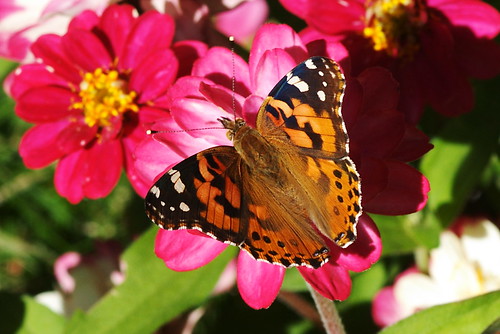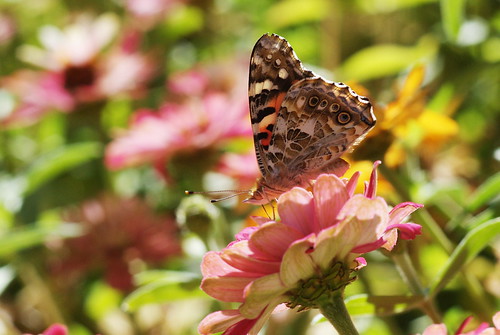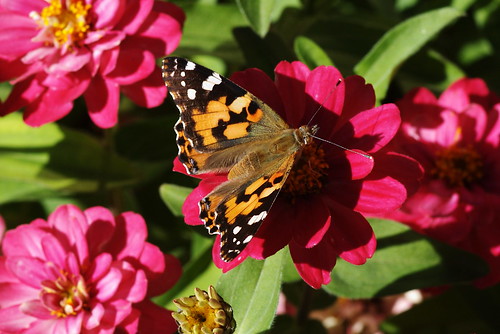
I try to bring my camera with me almost wherever I go, because I never know when a great photo opportunity will present itself. Earlier this week I was teaching piano lessons at Regis University and had some time to kill when one of my students didn't show up. I decided to go for a walk around campus, but didn't get more than 20 feet beyond the front door of the building, because I found myself surrounded by a cloud of butterflies that were feeding in a flower bed next to the building. I've never seen them there before, but assume they must be passing through as part of a migration, or maybe conditions were just right for them this year.

I spent the next twenty minutes attempting to photograph them. In doing so, I looked more closely at the insects than I ever had before, and learned some things about them I probably should have known already but didn't . For instance, this species at least feeds with wings closed. The butterflies extend their wings only just before taking off and just after landing, or when a gust of wind causes them to lose their balance. I learned to anticipate these moments as the best times to shoot. Even so, it took a great deal of patience and luck to get even a few decent shots.

For the joy these creatures gave me while shooting, for what learned in the process, and for the pictures I ended up with, I have to figure those were among the best twenty minutes I've spent all year.

2 comments:
This is an eye opening posting.
I have always loved nature, done my part. But once I started shooting insects through my macro lens, I realized the reality of it all. I could see their little heads turn, and how they move. In cases like termites, you could even see their food passing through them :)
Theres no way you could stomp a spider ever again, if you cared enough to photograph the little fella's.
Nice work Marc.
Thanks for the comment!
Interestingly, the next week the butterflies were still there, if not as many of them. The flowers were definitely looked a week older too. And unlike the previous week, this time the butterflies kept their wings extended while feeding. Perhaps they were having to dig deeper to get the nectar, and they needed their wings for balance?
It is kind of amazing how little one can know about something one sees fairly often, and how much one can learn by observation. Or at least, one can hypothesize, then over time hopefully collect enough data to prove or disprove the hypothesis. Of course, this is exactly how the body of scientific knowledge has grown over the centuries. But it is so seldom I experience the process first hand.
Post a Comment